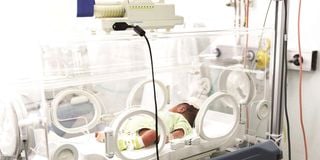8,000 infants were at risk of death due to cold weather

The study was conducted by scientists at the KEMRI Wellcome Trust Research Programme in 21 new born units.
What you need to know:
- Hypothermia is caused by prolonged exposures to very cold temperatures.
- When exposed to cold temperatures, your body begins to lose heat faster than it is produced. Lengthy exposures will eventually use up your body’s stored energy, which leads to lower body temperature.
Scientists have found that 8,391 newborns in hospitals across the country developed hypothermia last year.
Hypothermia, they explain, is caused by prolonged exposures to very cold temperatures.
When exposed to cold temperatures, your body begins to lose heat faster than it is produced. Lengthy exposures will eventually use up your body’s stored energy, which leads to lower body temperature.
The study was conducted by scientists at the KEMRI Wellcome Trust Research Programme in 21 new born units.
The study author, John Mwangi, notes that a total of 58,804 newborns were included in the analysis.
“Out of these, 47,999 (82 per cent) had their admission temperature recorded and 8,391 (17.5%) had documented hypothermia,” he notes.
He adds that hypothermia prevalence decreased over the study period while admission temperature documentation increased.
The researchers point out that significant associations were found between low birthweight and very low (0-3) APGAR (appearance, pulse, grimace, activity, and respiration) scores with hypothermia at admission.
They also observed that odds of documented hypothermia reduced as ambient temperature and month of participation in the Clinical Information Network (a collaborative learning health platform for healthcare improvement) increased.
“Hypothermia at admission was associated with a 35 per cent increase in odds of neonatal inpatient death,” the study highlights.
Globally, neonatal hypothermia, associated with increased morbidity and mortality, prevails widely, ranging from 32 per cent to 85 per cent in hospital settings immediately post-birth.
Reports on hypothermia from high-burden countries like Kenya among sick new borns often include few centers or relatively small sample sizes, the scientists note.
The researchers concluded that a substantial proportion of new borns are admitted with hypothermia, indicating a breakdown in warm chain protocols after birth at the facilities.
“And also intra-hospital transport that increases odds of mortality,” the author of the study said.
He recommends urgent implementation of rigorous warm chain protocols, particularly for low-birth-weight babies.
This is because it is crucial to protect these vulnerable newborns from the detrimental effects of hypothermia.





